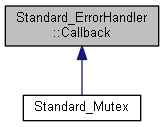Defines a base class for callback objects that can be registered in the OCC error handler (the class simulating C++ exceptions) so as to be correctly destroyed when error handler is activated. More...
#include <Standard_ErrorHandler.hxx>

Public Member Functions | |
| void | RegisterCallback () |
| Registers this callback object in the current error handler (if found). More... | |
| void | UnregisterCallback () |
| Unregisters this callback object from the error handler. More... | |
| virtual | ~Callback () |
| Destructor. More... | |
| virtual void | DestroyCallback ()=0 |
| The callback function to perform necessary callback action. Called by the exception handler when it is being destroyed but still has this callback registered. More... | |
Protected Member Functions | |
| Callback () | |
| Empty constructor. More... | |
Detailed Description
Defines a base class for callback objects that can be registered in the OCC error handler (the class simulating C++ exceptions) so as to be correctly destroyed when error handler is activated.
Note that this is needed only when Open CASCADE is compiled with OCC_CONVERT_SIGNALS options (i.e. on UNIX/Linux). In that case, raising OCC exception and/or signal will not cause C++ stack unwinding and destruction of objects created in the stack.
This class is intended to protect critical objects and operations in the try {} catch {} block from being bypassed by OCC signal or exception.
Inherit your object from that class, implement DestroyCallback() function, and call Register/Unregister in critical points.
Note that you must ensure that your object has life span longer than that of the try {} block in which it calls Register().
Constructor & Destructor Documentation
◆ ~Callback()
|
inlinevirtual |
Destructor.
◆ Callback()
|
inlineprotected |
Empty constructor.
Member Function Documentation
◆ DestroyCallback()
|
pure virtual |
The callback function to perform necessary callback action. Called by the exception handler when it is being destroyed but still has this callback registered.
◆ RegisterCallback()
|
inline |
Registers this callback object in the current error handler (if found).
◆ UnregisterCallback()
|
inline |
Unregisters this callback object from the error handler.
The documentation for this class was generated from the following file: